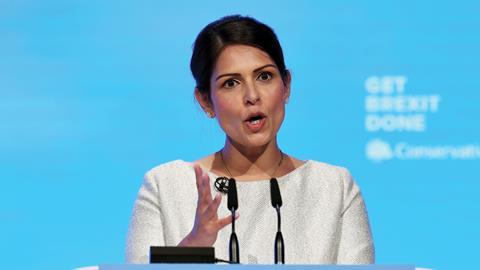Senior Tories talked tough on crime at the party conference while emphasising their respect for the judiciary after the prorogation judgment. But all anyone really wanted to discuss was Brexit
At last week’s party conference in Manchester the Conservatives had two justice-related aims: first, don’t mention that judgment; and second, push the line that toughness on crime is back on the agenda. As long as they stuck to that script, they would regard the exercise as a job well done.

Many delegates were willing to talk about the Supreme Court (and radical constitutional reform was discussed by a vocal few) but criticism of its judgment on prorogation was off limits for the party hierarchy. Chairs of fringe events on the rule of law invariably urged attendees not to discuss the prorogation ruling – a forlorn plea, as it turned out. But when ministers were pressed, they played a straight bat.
Lord chancellor Robert Buckland QC told a meeting of the Society of Conservative Lawyers that he ‘believes utterly’ in the rule of law and knew the prime minister agreed with him.
Speaking at a different event, prisons minister Lucy Frazer QC said: ‘It is really important we ensure again that the judiciary, when they hand down their judgments, are respected. The PM and lord chancellor have made very clear their respect for the judgment.’
Solicitor general Michael Ellis QC moved the conversation on a little, insisting there was nothing wrong with debating the merits of a ruling, so long as criticism or analysis does not extend to personal attacks. ‘It is perfectly proper to criticise the reasoning behind certain judgments. We don’t personalise that,’ he said.
‘It is also perfectly proper to debate where the boundaries are between the executive and the judiciary. Our judges are not shrinking violets and there is nothing wrong with criticising judges. We have a robust system and we want to continue that.’
What the party really wanted to talk about in the justice sphere was its renewed law and order pitch. It was unfortunate that the leader had been found by the Supreme Court to have acted unlawfully; just as it was unfortunate that an MP was reportedly involved in a ‘bust-up’ in the conference centre just hours before Buckland and home secretary Priti Patel were due to bang that particular drum.
'It is perfectly proper to debate where the boundaries are between the executive and the judiciary. Our judges are not shrinking violets and there is nothing wrong with criticising judges'
Michael Ellis QC, solicitor general
Patel outlined her hardline approach to delighted delegates, even if her ‘criminals – we’re coming for you’ line rang rather hollow for lawyers who wonder what she plans to do with these criminals once they are apprehended.
There was also scepticism within the profession about Buckland’s pledge to ensure the most serious offenders serve a minimum of two-thirds of their sentence, rather than half. But the policy went unchallenged in news bulletins and certainly went down well in the hall.
What did not feature, largely because it was absent from Buckland’s speech, was the lord chancellor’s intention to drop predecessor David Gauke’s plan to abolish custodial sentences of less than six months. The policy never sat well with backbenchers or party members alike.
Otherwise, there was barely a mention of justice matters on the conference floor or in the fringe events. The one event dedicated to access to justice had an empty chair where the invited justice minister – apparently required to be in Westminster – should have been. This led to the largely pointless exercise of legal aid campaigners talking to themselves for an hour about problems they already knew about. The minister’s absence was an unfortunate byproduct of parliament being recalled, but it was not a good look, particularly after Labour went big on access to justice in Brighton.
While the government talks up spending pledges for the Crown Prosecution Service, there is no plan for increasing funding to defence lawyers (albeit Buckland privately acknowledged this is a problem).
Chancellor Sajid Javid made no new justice spending commitments. In summary, there was little to suggest the Tories are mulling a legislative programme that will have a far-reaching effect on solicitors’ working lives.
































No comments yet